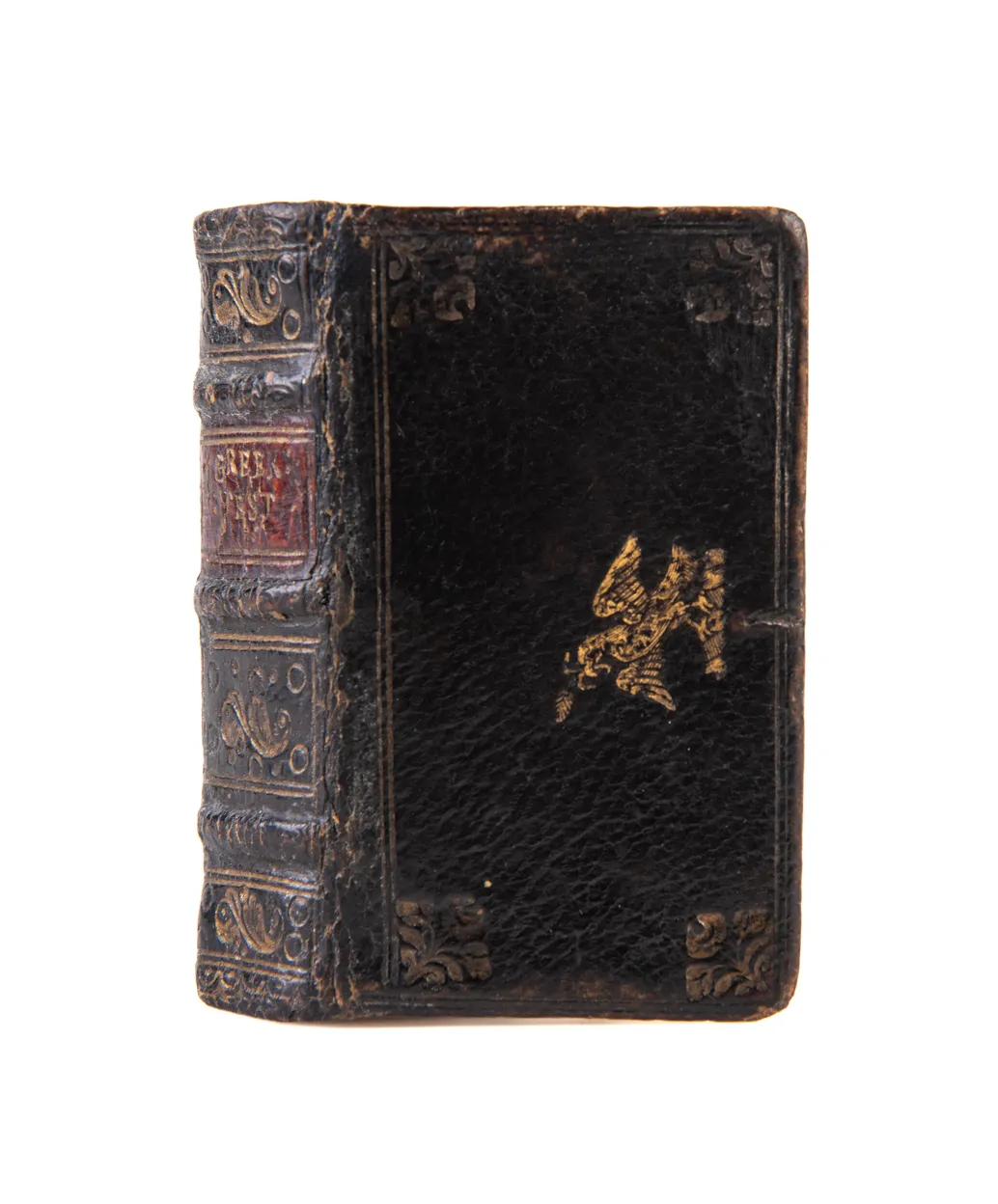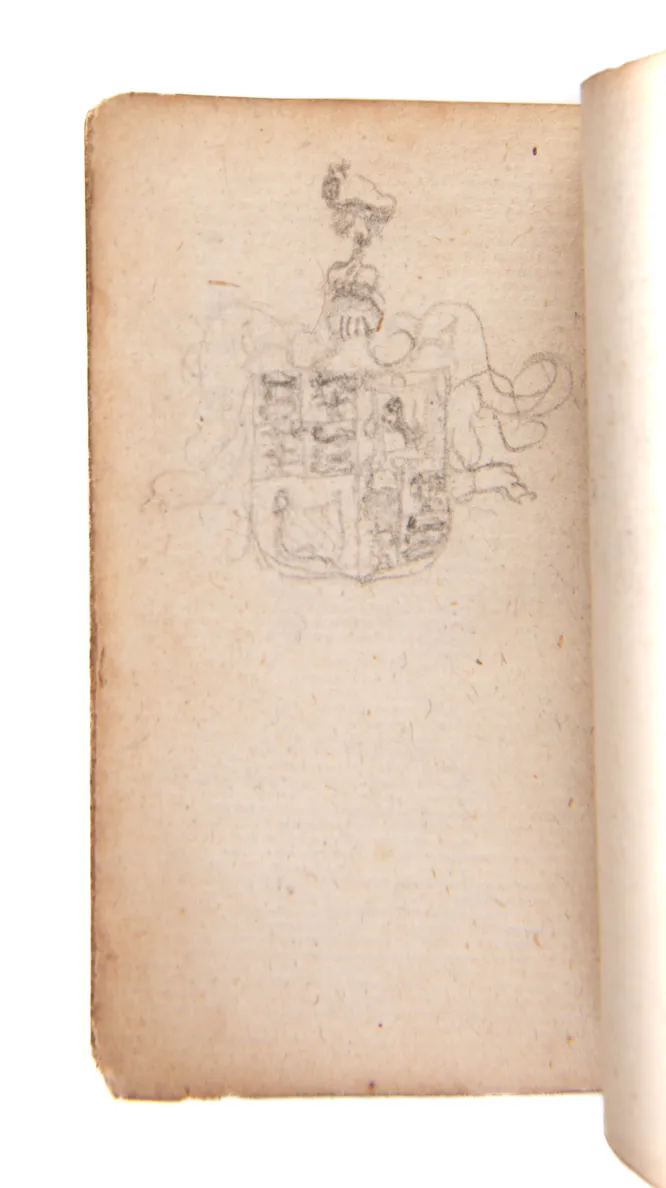Darlow & Moule 4676.
"The smallest Greek Testament ever printed, with the exception of Pickering's miniature edition of 1828": A handsome copy of a famous miniature book in a curious binding of English black morocco later stamped with a gilt lark device for Thomas Clerke of Beckenham Kent and with elements of Clerke's bookplate cut-up and fixed to the pastedowns.
This is the first appearance of Jean Jannon's minute Greek type - the smallest Green testament ever printed until Pickering's 19th-century edition (see Darlow and Moule). Jannon had previously issued a Virgil (1625) and Horace (1627) in this small format. Jean Jannon (1580-1658) worked for a short time in Paris until, owing to religious troubles, he set up a press in Sedan. He was forced to cut his own type, the most famous of which is the Sedanoise. The colophon of this work is dated 1 March 1629. The text reproduces the first Elzevir New Testament of 1624.
Provenance: 1. Rev. Richard Peter (d. 1748), Vicar of Eltham Kent, inscribed on the front flyleaf in ink "E Libris R Peter 1696 Aprilis Calend". Peter (or Peters) was admitted to Peterhouse, Cambridge in December 10th 1691, the son of John Peter of Newport, Buckinghamshire, deceased. Matriculated 1695, BA 1695-6, ordained deacon February 1696-7, priest March 1697-6 and was vicar of Eltham in Kent 1726-1748. Given by Peter to:
2. Rev. Thomas Clerke (d. 1765), rector of St George's, Beckenham, Kent, from 1711; inscribed on the front flyleaf: "E Libris T: Clerke 1727 / E Dono Rich: Peters Rec: de Eltham Com: Cantio" and with another similar inscription on the rear flyleaf. It was also Thomas Clerke who had the lark with an ear of wheat in its beak stamped on the upper and lower covers. Clerke has also cut the central section from his engraved armorial bookplate (argent on a bend gules between three pellets as many swans proper) and pasted it on the front pastedown - the entire bookplate would have been too large to insert in such a small book. An example of Thomas Clerke's bookplate in its entirety survives in an album at Downside School. On the rear pastedown Clerke has pasted a drawing of the lark holding an ear of wheat - it is not the engraved lark from the bookplate - and may perhaps be the original sketch used to produce the small armorial device for the cover. There is also a basic pencil sketch of part of Clerke's arm on one of the flyleaves and a crude pencil sketch of the Royal arms at the rear. Clerke's son John (1711-1790) was friends with the poet Thomas Gray at Cambridge ("His chief and almost his only friend at Peterhouse" Ketton-Cremer, Thomas Gray, p.70). John Clerke was admitted initially to St Catharine's in April 1734 but migrated to Peterhouse (Gray's college) in 1735. Clerke was admitted a Fellow of the Royal College of Physicians on 30 Sept. 1756 and practised as a physician at Epsom. His wife Jane died in childbirth (aged 31) in 1757. An epitaph, "Lo! where this silent Marble weeps | A friend, a wife, a mother sleeps" by Gray is inscribed on a tablet in St George's Church, Beckenham (see the Thomas Gray Archive online). It was included in editions of Gray's Poems and was much-anthologised.
3. Rev. Thomas Renwick (d. 1874), vicar of Shorwell, Isle of Wight, inscribed on the verso of the initial front flyleaf: "Thomas Renwick | Dec 6th 1839". Renwick was the son of rear-admiral Thomas Renwick of Honiton, Devon. He matriculated at Christ Church, Oxford on 11 December 1839 so this miniature New Testament may well have marked that occasion. Renwick graduated BA in 1843 and was rector of Mottistone and later vicar of Shorwell on the Isle of Wight until his death in October 1874. Given by Renwick to,
4. Rev. John Brasher Fawkes (d. 1856), inscribed on the recto of the second front flyleaf: "John B Fawkes E Dono Tho Renwick". Fawkes, like Renwick, went to Christ Church, Oxford (matriculated 1837, BA 1841, MA 1849 and was chaplain at the college 1841-4. Fawkes was perpetual curate of Daresbury, Cheshire from 1843 until his death in December 1856 aged 41. He was the son of William Fawkes of Kidderminster.








